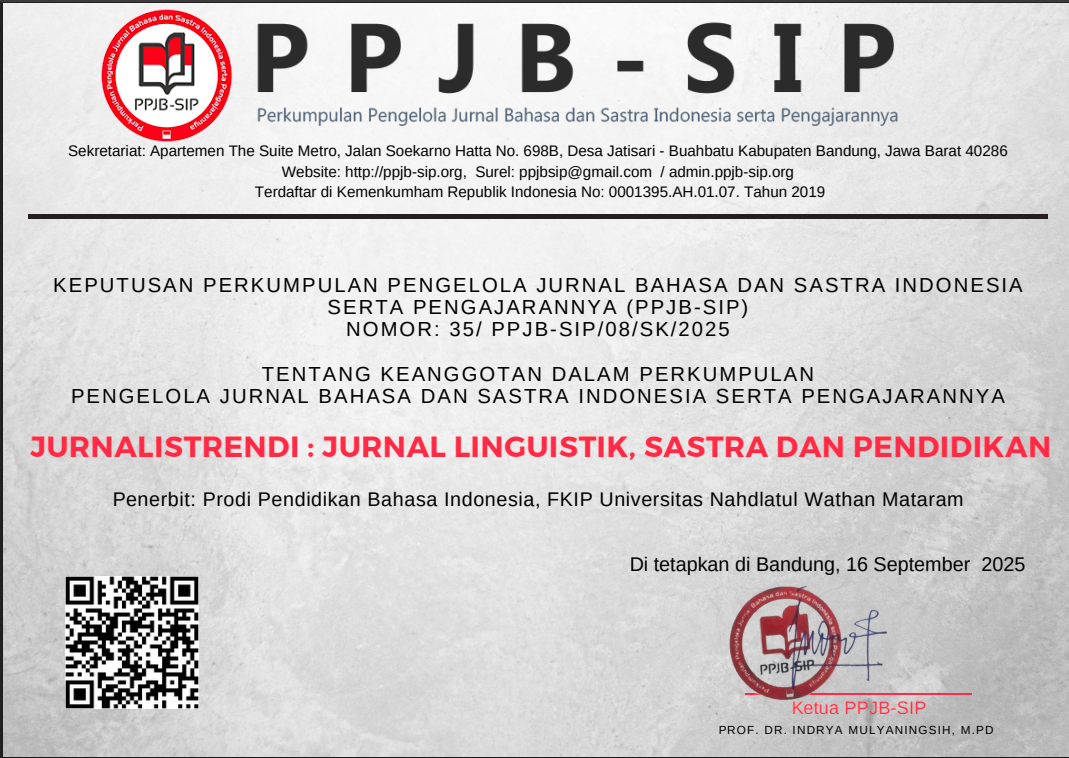Setting up The Punchline In Conventional and Non-Conventional Pragmatics In Comedy Setups
Abstract
This study investigates how conventional and non-conventional pragmatic strategies shape humor in comedic setups across various platforms such as stand-up comedy, sitcoms, and digital content. With the growth of digital media and the increasing diversity of comedic styles, understanding the use of pragmatic strategies in humor has become essential to grasping the social and cultural dynamics embedded in comedy. Using a qualitative discourse-pragmatic approach, the research applies Grice's Cooperative Principle as well as Incongruity and Relevance Theory to analyze how comedians construct and deliver humor. Data were collected through the analysis of transcripts from popular comedy shows and digital content to identify patterns in the use of pragmatic strategies. The findings reveal that conventional pragmatic strategies—such as presupposition and implicature—enhance audience relatability and accessibility by drawing on shared schemas and logical coherence. In contrast, non-conventional strategies—such as irony, hyperbole, and absurdity—flout conversational norms to trigger surprise and reinterpretation, often resonating more strongly in specific cultural or stylistic contexts. The study concludes that an effective comedic setup often results from a balance between adhering to and subverting pragmatic norms, allowing for both emotional connection and intellectual engagement. This research contributes to linguistic and humor studies by offering insights into how language use in comedy reflects broader social and cultural dynamics.
Downloads
References
Akinkurolere, S. O. (2013). Students’ perception on the use of humor in the teaching of English as a second language in Nigeria. International Education Research, 1(2), 65–73. https://doi.org/10.12735/ier.v1i2p65
Attardo, S. (2017). Humor in language. Oxford Research Encyclopedia of Linguistics, 1–18. https://doi.org/10.1093/acrefore/9780199384655.013.342
Attardo, S. (2021). Humor, irony, and meaning construction: Pragmatic and semantic perspectives. Oxford University Press.
Bell, N. D. (2023). Humor and second language pragmatics: A contemporary view. Applied Pragmatics, 5(2), 145–162.
Chen, J. (2020). A study of conversational implicature in the movie “Flipped” based on Cooperative Principle and Politeness Principle. International Journal of Social Science and Economics Invention, 6(9), 339–341. https://doi.org/10.23958/ijssei/vol06-i09/229
Chovanec, J. (2021). Humor and social media discourse: Identity and stance in online communication. Journal of Pragmatics, 179, 68–78.
Cristina, V., & Afriana, A. (2021). Functions of conversational implicature in TV show “F.R.I.E.N.D.S”: Pragmatics approach. Jurnal BASIS, 8(1), 75–84. https://doi.org/10.33884/basisupb.v8i1.2935
Dews, S., & Winner, E. (2020). Pragmatics and humor: The theory of humor in context. Cambridge University Press.
Dynel, M. (2024). Irony and deception in digital humor: Relevance, intention, and interpretation. Journal of Language and Politics, 23(1), 100–118.
Dynel, M. (2020). Humour in social media: A pragmatic perspective. Springer.
Gao, X. (2023). Verbal humor in stand-up comedy “Rock & Roast” with the GTVH theory. BCP Education & Psychology, 9, 389–394. https://doi.org/10.54691/bcpep.v9i.4711
Hartono, M. A. S. (2023). Conversational implicature found while Trevor Noah criticizes the government in stand-up comedy show. Foremost Journal, 4(2), 163–175. https://doi.org/10.33592/foremost.v4i2.3723
Kotthoff, H. (2006). Pragmatics of performance and the analysis of conversational humor. Humor, 19(3), 271–304. https://doi.org/10.1515/HUMOR.2006.015
Lalić, E. L. (2020). Grice’s theory of implicature [Undergraduate thesis, University of Zagreb]. https://urn.nsk.hr/urn:nbn:hr:186:320523
Long, R. (2020). The role of pragmatics in humor: A comprehensive analysis of comedy acts and their reception. Palgrave Macmillan.
Mohammed Rashid, K. H. A., & Al-Ghezzey, A. (2023). A pragmatic study of implicature in Iraqi’s election propaganda posters. Lark Journal, 48(1), 2663–5836.
Sabila, P. (2024). Unraveling implicature in racial humor stand-up comedy on YouTube. Journal of English Teaching, Applied Linguistics and Literatures (JETALL), 7(1), 111. https://doi.org/10.20527/jetall.v7i1.18506
Sari, P., & Litbagay, A. J. (2019). Implicature in the dialogue of 500 Days of Summer movie by Marc Webb: The study of pragmatics. English Journal Literacy Utama, 3(1), 35–39. https://doi.org/10.33197/ejlutama.vol3.iss1.2019.32
Simaremare, Y. N., Nainggolan, W. C., & Herman, H. (2021). Pragmatics analysis on conversational implicature used in Mulan (2020) movie. Middle European Scientific Bulletin, 15, 64–74. https://doi.org/10.47494/mesb.2021.15.696
Widiana, Y. (2014). A pragmatics study on jokes and the implicature in broadcast messages. International Journal of Social, Behavioral, Educational, Economic, Business and Industrial Engineering, 8(9), 3144–3148. http://waset.org/publications/10003147
Tsakona, V. (2022). Humor and society: Exploring the role of humor in social interaction and political discourse. Humor: International Journal of Humor Research, 35(1), 45–67.
Ziv, A., & Givon, T. (2019). Pragmatics of humor: A study of the humor mechanisms in communication. Routledge.
Copyright (c) 2024 JURNALISTRENDi : JURNAL LINGUISTIK, SASTRA, DAN PENDIDIKAN

This work is licensed under a Creative Commons Attribution-NonCommercial 4.0 International License.

.jpg)




